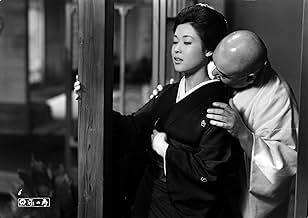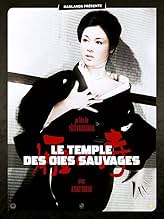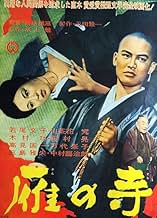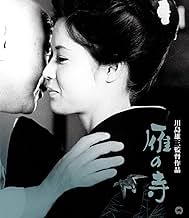Füge eine Handlung in deiner Sprache hinzuSatoko is a mistress by trade, or fate: when her master, the silkscreen artist of the Kohoan Temple in Kyoto, dies, she is given to the temple's lascivious head priest Kikuchi.Satoko is a mistress by trade, or fate: when her master, the silkscreen artist of the Kohoan Temple in Kyoto, dies, she is given to the temple's lascivious head priest Kikuchi.Satoko is a mistress by trade, or fate: when her master, the silkscreen artist of the Kohoan Temple in Kyoto, dies, she is given to the temple's lascivious head priest Kikuchi.
- Regie
- Drehbuch
- Hauptbesetzung
Seishirô Hara
- Mori
- (as Seijiro Haro)
Empfohlene Bewertungen
When her old master, a great silkscreen artist dies, he sends Ayako Wakao to be cared for by Abbot Masao Mishima. He is not an ascetic sort of man. He smokes, he goes on the occasional pub crawl, and he uses Miss Wakao as his bed mate. She accepts it all. It's a woman's place, even in a rapidly modernizing Japan, where other monks get married and take nude photos of their wives, and the aftermath of funerals is cards for money. Kuniichi Takami is baffled by it all. He comes from a place called 'Beggar's Valley', of which he is deeply ashamed, will not admit to knowing who is parents are, and begins an affair with Miss Wakao at her instigation, all of which makes it difficult to attain enlightenment, or even understand the concept.
I've been trying to think of a good description for the attitude of this movie by Yûzô Kawashima, from a novel by Tsutomu Minakami, Is it Rabelaisian, mocking the norms with a goodly dose of bawdiness? Perhaps. Is it Hogarthian, disapproving and visually dark? It has those elements. Does it partake of the sensibilities of Utamora, the Japanese printmaker whose works were so smutty that he was arrested and disappeared? Probably all three.
This movie centers around the relationship of its three leads. Mishima is the abbot, able to do what he wants, and so he terrorizes Takami, but is obsessed by the intensely sexual Miss Wakao; Miss Wakao seems to seek dominance, but doesn't know what to do with it with Mishima, while seeking to be dominated by Takami; and Takami is terrified of and hates Mishima, is terrified of of Miss Wakao, and tries to dominate her when he is not retreating from her awkward advances. It's an unstable situation, and it will all end, but will there be anything left?
I've been trying to think of a good description for the attitude of this movie by Yûzô Kawashima, from a novel by Tsutomu Minakami, Is it Rabelaisian, mocking the norms with a goodly dose of bawdiness? Perhaps. Is it Hogarthian, disapproving and visually dark? It has those elements. Does it partake of the sensibilities of Utamora, the Japanese printmaker whose works were so smutty that he was arrested and disappeared? Probably all three.
This movie centers around the relationship of its three leads. Mishima is the abbot, able to do what he wants, and so he terrorizes Takami, but is obsessed by the intensely sexual Miss Wakao; Miss Wakao seems to seek dominance, but doesn't know what to do with it with Mishima, while seeking to be dominated by Takami; and Takami is terrified of and hates Mishima, is terrified of of Miss Wakao, and tries to dominate her when he is not retreating from her awkward advances. It's an unstable situation, and it will all end, but will there be anything left?
Director Yûzô Kawashima excelled in portraying the psychological tensions underlying our human relationships. This dark melodramatic tale sees two young people misused in different ways, both are internally tormented, both are bound by the social traditions of the times. Enchanting Ayako Wakao (Satoko) is a mistress by trade, her fate. When her former master, the silkscreen artist of the Kohoan Temple in Kyoto, dies, she is passed on to the temple's lecherous head priest Kikuchi. She feels empathy for the harshly treated melancholy young novice monk Jinen, who resides there also. Jinen has observed the profligacy of his cruel master and Satoko's absolute dependence on this man. He is both fascinated and disturbed by the interest Satoko takes in him. Jinen is confronted by his loathing of his master, the dark circumstances of his birth and his own moral weakness... Based on an autobiographical novel by Tsutomu Mizukami Gan no tera (Temple of the Geese) which won the Naoki Prize in 1961
How could a film with such wacky characters fail ? There's a Zen monk who drinks, smokes and openly keeps a young woman as a bed companion. There's the young woman, who also smokers, and has a go at seducing the junior monk as well. The junior monk is an unwanted, abandoned child, whose name literally means "thrown away". And there's a few other monks who also smoke.
The cinematography is impressive and dark, but the pace is quite slow, and the direction ponderous. Despite a few rather wacky events, the proceedings don't really hold interest.
The cinematography is impressive and dark, but the pace is quite slow, and the direction ponderous. Despite a few rather wacky events, the proceedings don't really hold interest.
Top-Auswahl
Melde dich zum Bewerten an und greife auf die Watchlist für personalisierte Empfehlungen zu.
Details
- Erscheinungsdatum
- Herkunftsland
- Sprache
- Auch bekannt als
- The Temple of Wild Geese
- Drehorte
- Produktionsfirma
- Weitere beteiligte Unternehmen bei IMDbPro anzeigen
- Laufzeit1 Stunde 38 Minuten
- Farbe
- Sound-Mix
- Seitenverhältnis
- 2.35 : 1
Zu dieser Seite beitragen
Bearbeitung vorschlagen oder fehlenden Inhalt hinzufügen

























